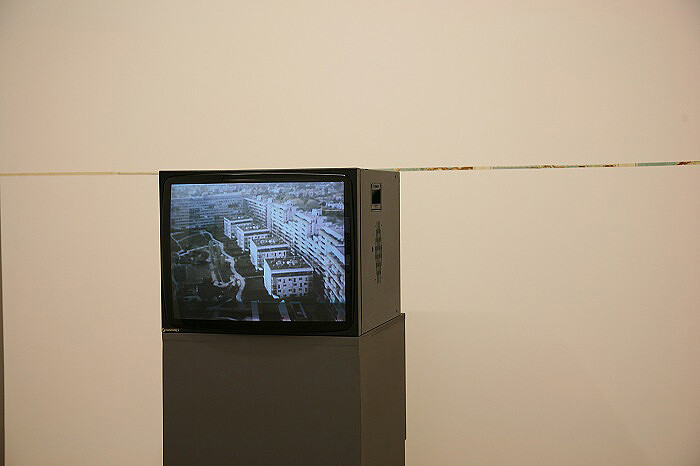An anti-censorship quote 1 from the first century claims that when paper burns the words fly away. But what happens when the paper itself is granted flight? In the film Manifestul (Manifesto, 2005) a hand appears from the edge of a balcony and releases a cluster of pages. They swirl about, filling the frame as a breeze forms an accidental background score. Several of Mona Vătămanu and Florin Tudor’s films, including this one, are made at an in-between time—neither day nor night—but a gray hour that holds the cinematic image in a state of aporia. It is in this suspended space that temporal gestures find grounding and a certain materiality—be it in the carrying of dust (Praful / The Dust, 2006), covering the floor of an exhibition space with rust (The Path / Rust Ingots, 2009), or the painting of revolutionary scenes as acts of remembrance (the series “Appointment with History”).
Vătămanu and Tudor invent vulnerable architectures that draw upon the violently fragmented modernism of post-socialist Romania. Their articulations of loss within Ceaușescu’s dictatorship are conceived in conversation with places and things as “survivors” of history. However, rather than inhabiting chronological pathways, the artists’ works serve as a rehearsal ad infinitum.
Manifestul treats the terraced buildings of the Alt-Erlaa housing complex in Vienna as an echo chamber, revealing once more that there is no outside to structures of power. The film brings forth a flurry of superimposed images of “a manifesto” as history’s parasite and contemporary detritus. But what we are actually watching in the really real present is an atmospheric dance of blank pages. In this illusory staging we are made aware that the past may no longer be recalled via monumentalized image-making, but rather as an incomplete and always-shifting visual paradigm. Hence, Manifestul may be understood in terms of a hologram: an impression of “three-dimensionality” created through a strategic dispersal of light, its intersection with a recording device, and the choreographic meeting of sight with object-forms. This holography of dissent, if you will, is a technical mode of rendering an image field in the continuous present through the interference and diffraction of a memory-object.
In Horizon (2012), a site-specific work made for the exhibition “Geometric Analogies,” a false border is fabricated from thin strips of an atlas, bisecting the room. As the physical map—a system of universal measure—is dismantled, it is recast as a subjective contour. Here the horizon is affirmed as a “never attainable” space; not merely as shimmering distance but as a limit-figure, which dwells in the crux of the production of meaning. The installation Horizon captures the dialectics of belonging, and it is when this line of division infiltrates the pristine gallery window that one also becomes an unintentional surveyor of all that is local—the passage of a black cab, a dreary hotel window, a sprinting man with a large umbrella and trim jacket.
The Order of Things (2011–12), Vătămanu and Tudor’s most recent film, is set in a Middle Eastern bakery in Berlin’s Kreuzberg district. It is just before dawn and the making of bread is already commencing. Interspersed with hands mixing, kneading, and rolling dough are shots of a globe being skinned meticulously. The productive labor of baking juxtaposed with the persistent destruction of this globe seems to be closely watched over by an abstract painting fixed to a wall in the bakery (partially damaged by the heat of the oven). The fragmented globe is painstakingly crafted into a portable pyramid and then taken onto an open field only to be set on fire. As the scenes of bread making in tandoor ovens coincide with the burning of the sculptural globe-cum-pyramid, the images take on textures of a forest fire—the irrepressible consumption of a landscape. The film is overlaid by the words of Chirikure Chirikure, a Zimbabwean poet:
Celebrating the political freedom of my motherland
Shall I celebrate with wine, music and dance?
With my broken back and bruised spirit,
Shall I celebrate with wine, music and dance?
No! I shall celebrate by casting my eyes further,
For beyond that horizon lies another horizon.
When one turns to leave the gallery, it is here that the memory-object makes a re-appearance as filmic afterlife—the baked globe-pyramid now sits atop a pile of concrete blocks. Totemic, its burnt flesh is a reminder of those other ignited bodies in those other streets, far from the melting snow of Brussels.
In Critical Essays (1972), Roland Barthes characterizes the writer as a “public experimenter.” Perhaps the same may be said of Vătămanu and Tudor: in their persistent search for a “larger language,” they foster forms that uplift themes from the hollow of rhetoric into signification patterns of the imaginary.
Attributed to Rabbi Akiva ben Joseph (ca. 50–135 C.E.) as a comment on public burning of the Torah as well as the destruction of other sacred texts under Seleucid and Roman rule.







